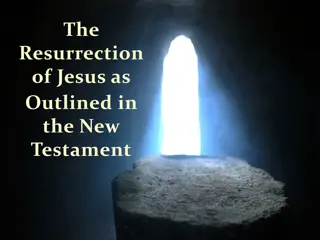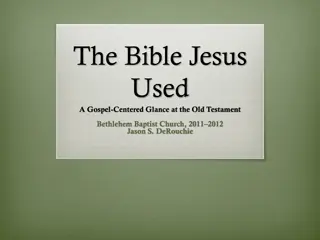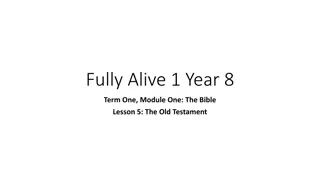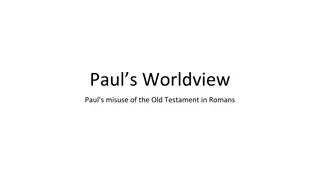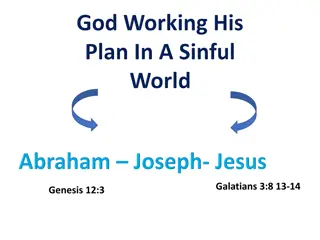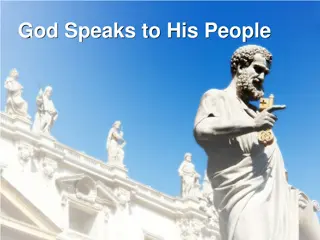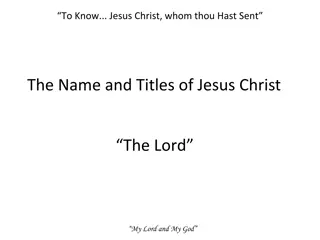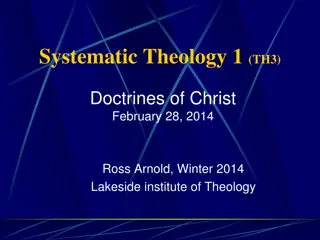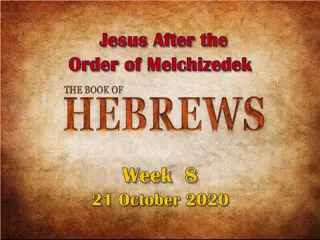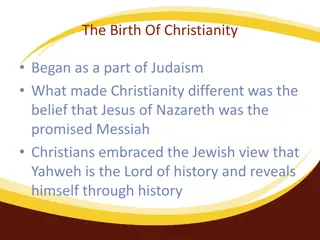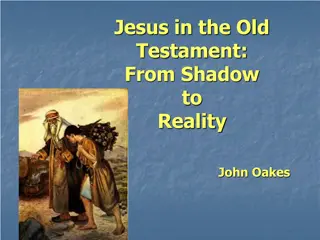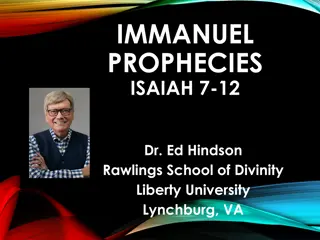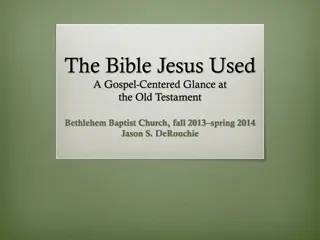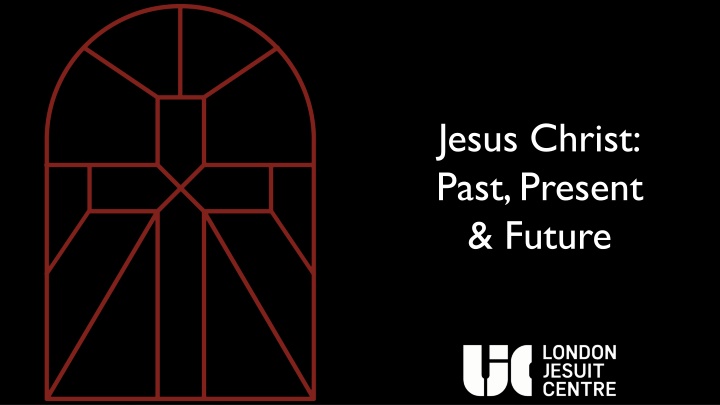
Jesus in the New Testament: Monotheism and Belief
Explore the intricate relationship between Jesus and monotheism in the New Testament, questioning how early Christian belief emerged from Jewish monotheism and the challenges it presented. Delve into the concept of Jesus as God within a monotheistic framework.
Download Presentation

Please find below an Image/Link to download the presentation.
The content on the website is provided AS IS for your information and personal use only. It may not be sold, licensed, or shared on other websites without obtaining consent from the author. If you encounter any issues during the download, it is possible that the publisher has removed the file from their server.
You are allowed to download the files provided on this website for personal or commercial use, subject to the condition that they are used lawfully. All files are the property of their respective owners.
The content on the website is provided AS IS for your information and personal use only. It may not be sold, licensed, or shared on other websites without obtaining consent from the author.
E N D
Presentation Transcript
Jesus Christ: Past, Present & Future
2. Jesus in the New Testament (9th November 2024)
Jesus, God and monotheism in the NT Dr Stuart Jesson, London Jesuit Centre This Photo by Unknown Author is licensed under CC BY
Jesus and God in the New Testament For discussion: 1. Read the texts together; 2. Have a think about what each one is (and is not) saying, or implying about Jesus; 3. Are there any interesting differences between them? Do they present the relationship between Jesus and God consistently? 4. What questions do they leave you with, about the Christian understanding of Jesus?
Jesus and monotheism An important question for NT scholars: how did early Christian belief about Jesus emerge from, and within, Jewish monotheism? How could first century Jews have affirmed that Jesus was God, whilst maintaining their monotheism? - Were they likely to have had a low Christology at first, because of their strict monotheism (perhaps with Jesus as an exalted, but human Messiah, or some kind of intermediary spiritual being)? - Or did they risk betraying their monotheism in the affirmation that Jesus was Lord : did they claim that there were two gods? - Or, was there something about their monotheism that was utilised to make entirely new, high Christological claims about Jesus?
Jesus and monotheism Often it has been assumed by scholars that the first Christian thinkers, who were all Jewish, e.g. Paul, did not consider the possibility that Jesus could actually be God. E.g. Young, The Making of the Creeds: the God of the Jews had always had his servants, prophets, kings, angels to reveal his will and proclaim his word, to be sons . The Messiah, or the supernatural agent of God who would officiate at the end of the world, was a special but perhaps not dissimilar case. It was the one God of Abraham, Isaac and Jacob that Jesus Christ revealed, Paul never questioned that, no matter how great the honours granted to the Son whom God had sent into the world, and whom God had raised from the dead. [. . .] Something like this attitude must account for the fact that the question was not an explicit issue for the writers of the New Testament. (Young, p. 34).
Jesus and monotheism So it could be that the question of how worship of the exalted Lord Jesus was compatible with monotheism was only carefully considered in the face of criticism from outside, in the second century (e.g. by the Apologists like Justin Maryr and Tertullian). Christianity was presented as a strict monotheism and a high morality, together with an assurance of life after death for the faithful. Little wonder that enquirers and doubters, not to mention opponents would soon raise questions about the being and status of this Jesus Christ in relation to God. So the logos theology may have been developed quite late, as a way to meet this challenge
Jesus and monotheism But this position has been challenged by Richard Bauckham, who suggests that the implication of the New Testament texts is that Jewish monotheism had already been used to claim divine identity for Jesus: the intention of New Testament Christology, throughout the texts, is to include Jesus in the unique divine identity as Jewish monotheism understood it. [. . .] They include Jesus in the unique divine sovereignty over all things, they include him in the unique divine creation of all things, they identify him by the divine name which names the unique divine identity, and they portray him as accorded the worship which, for Jewish monotheists, is recognition of the unique divine identity. (Bauckham, 1999: 26).
Jesus and monotheism Bauckham gives a powerful reading of 1 Corinthians text in his argument: Hence, as to the eating of food offered to idols, we know that no idol in the world really exists , and that there is no God but one. Indeed, even though there may be so-called gods in heaven or on earth as in fact there are many gods and many lords yet for us there is one God, the Father, from whom are all things and for whom we exist, and one Lord, Jesus Christ, through whom are all things and through whom we exist. (1 Cor 8: 6) Here Paul seems to echo the Shema : Hear, O Israel: The Lord is our God, the Lord is one. (Deut 6:4).
Jesus and monotheism So, according to Bauckham, even though we don t find in the New Testament a systematic account of what it could mean to say that Jesus, a man, was God, we find a distinctively Jewish way of identifying Jesus as the God of Abraham, Isaac and Jacob: - God alone creates all things; Jesus is the one through whom all things are created; - God alone rulesall things; all things have been handed to Jesus, who rules with God. This amounts to an identification of Jesus with God (different to thinking in terms of nature or essence ).
The definition of Chalcedon, A.D. 451 THEREFORE, following the holy fathers, we all with one accord teach men to acknowledge one and the same Son, our Lord Jesus Christ, at once complete in Godhead and complete in manhood, truly God and truly man, consisting also of a reasonable soul and body; of one substance with the Father as regards his Godhead, and at the same time of one substance with us as regards his manhood; like us in all respects, apart from sin; as regards his Godhead, begotten of the Father before the ages, but yet as regards his manhood begotten, for us men and for our salvation, of Mary the Virgin, the Godbearer; one and the same Christ, Son, Lord, Only-begotten, recognized in two natures, without confusion, without change, without division, without separation; the distinction of natures being in no way annulled by the union, but rather the characteristics of each nature being preserved and coming together to form one person and subsistence, not as parted or separated into two persons, but one and the same Son and Only-begotten God the Word, Lord Jesus Christ; even as the prophets from earliest times spoke of him, and our Lord Jesus Christ himself taught us, and the creed of the fathers has handed down to us. (Translation from Bettenson, Henry. Documents of the Christian Church. Oxford Univ. Press, 1947, p. 73)
Jesus and monotheism Contrast between two approaches: 1. What is the nature of God? what is it for God to be God, similar to question like what is it for a dog to be a dog? What is the divine essence? Answer could be: to be unchanging, uncreated, all-powerful, one, etc. 2. Who is God? who is the God who we worship? Answer: The one who created all things; who rules all things So early Jewish monotheistic Christ-followers asked: who is Jesus? and answered the one through whom all things were created, who rules all things. Was it inevitable that this position would lead to extended, and highly sophisticated theological and philosophical discussions?! Probably.



